Civil Engineering (CE) Exam > Civil Engineering (CE) Questions > Consider the pin-jointed plane truss shown in...
Start Learning for Free
Consider the pin-jointed plane truss shown in the figure (not drawn to scale). Let RP, RQ, and RR denote the vertical reactions (upward positive) applied by the supports at P, Q, and R, respectively, on the truss. The correct combination of (RP, RQ, RR) is represented by
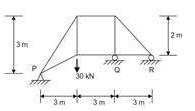
- a)(20, 0, 10) kN
- b)(10, 30, – 10) kN
- c)(30, –30, 30) kN
- d)(0, 60, – 30) kN
Correct answer is option 'C'. Can you explain this answer?
Verified Answer
Consider the pin-jointed plane truss shown in the figure (not drawn to...
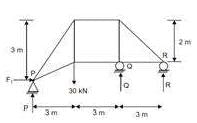

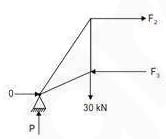
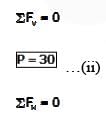
F2 = F3 …(iii)
F2 × 3 + 30 × 3 – F3 × 1 = 0
F2 × 3 – F2 × 1 + 90 = 0
2F2 = – 90
F2 = – 45
⇒ F3 = –45
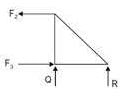
Q + R = 0 …(iv)
F3 × 2 + R × 3 = 0
– 45 × 2 + R × 3 = 0


|
Explore Courses for Civil Engineering (CE) exam
|

|
Similar Civil Engineering (CE) Doubts
Consider the pin-jointed plane truss shown in the figure (not drawn to scale). Let RP, RQ, and RR denote the vertical reactions (upward positive) applied by the supports at P, Q, and R, respectively, on the truss. The correct combination of (RP, RQ, RR) is represented bya)(20, 0, 10) kNb)(10, 30, – 10) kNc)(30, –30, 30) kNd)(0, 60, – 30) kNCorrect answer is option 'C'. Can you explain this answer?
Question Description
Consider the pin-jointed plane truss shown in the figure (not drawn to scale). Let RP, RQ, and RR denote the vertical reactions (upward positive) applied by the supports at P, Q, and R, respectively, on the truss. The correct combination of (RP, RQ, RR) is represented bya)(20, 0, 10) kNb)(10, 30, – 10) kNc)(30, –30, 30) kNd)(0, 60, – 30) kNCorrect answer is option 'C'. Can you explain this answer? for Civil Engineering (CE) 2025 is part of Civil Engineering (CE) preparation. The Question and answers have been prepared according to the Civil Engineering (CE) exam syllabus. Information about Consider the pin-jointed plane truss shown in the figure (not drawn to scale). Let RP, RQ, and RR denote the vertical reactions (upward positive) applied by the supports at P, Q, and R, respectively, on the truss. The correct combination of (RP, RQ, RR) is represented bya)(20, 0, 10) kNb)(10, 30, – 10) kNc)(30, –30, 30) kNd)(0, 60, – 30) kNCorrect answer is option 'C'. Can you explain this answer? covers all topics & solutions for Civil Engineering (CE) 2025 Exam. Find important definitions, questions, meanings, examples, exercises and tests below for Consider the pin-jointed plane truss shown in the figure (not drawn to scale). Let RP, RQ, and RR denote the vertical reactions (upward positive) applied by the supports at P, Q, and R, respectively, on the truss. The correct combination of (RP, RQ, RR) is represented bya)(20, 0, 10) kNb)(10, 30, – 10) kNc)(30, –30, 30) kNd)(0, 60, – 30) kNCorrect answer is option 'C'. Can you explain this answer?.
Consider the pin-jointed plane truss shown in the figure (not drawn to scale). Let RP, RQ, and RR denote the vertical reactions (upward positive) applied by the supports at P, Q, and R, respectively, on the truss. The correct combination of (RP, RQ, RR) is represented bya)(20, 0, 10) kNb)(10, 30, – 10) kNc)(30, –30, 30) kNd)(0, 60, – 30) kNCorrect answer is option 'C'. Can you explain this answer? for Civil Engineering (CE) 2025 is part of Civil Engineering (CE) preparation. The Question and answers have been prepared according to the Civil Engineering (CE) exam syllabus. Information about Consider the pin-jointed plane truss shown in the figure (not drawn to scale). Let RP, RQ, and RR denote the vertical reactions (upward positive) applied by the supports at P, Q, and R, respectively, on the truss. The correct combination of (RP, RQ, RR) is represented bya)(20, 0, 10) kNb)(10, 30, – 10) kNc)(30, –30, 30) kNd)(0, 60, – 30) kNCorrect answer is option 'C'. Can you explain this answer? covers all topics & solutions for Civil Engineering (CE) 2025 Exam. Find important definitions, questions, meanings, examples, exercises and tests below for Consider the pin-jointed plane truss shown in the figure (not drawn to scale). Let RP, RQ, and RR denote the vertical reactions (upward positive) applied by the supports at P, Q, and R, respectively, on the truss. The correct combination of (RP, RQ, RR) is represented bya)(20, 0, 10) kNb)(10, 30, – 10) kNc)(30, –30, 30) kNd)(0, 60, – 30) kNCorrect answer is option 'C'. Can you explain this answer?.
Solutions for Consider the pin-jointed plane truss shown in the figure (not drawn to scale). Let RP, RQ, and RR denote the vertical reactions (upward positive) applied by the supports at P, Q, and R, respectively, on the truss. The correct combination of (RP, RQ, RR) is represented bya)(20, 0, 10) kNb)(10, 30, – 10) kNc)(30, –30, 30) kNd)(0, 60, – 30) kNCorrect answer is option 'C'. Can you explain this answer? in English & in Hindi are available as part of our courses for Civil Engineering (CE).
Download more important topics, notes, lectures and mock test series for Civil Engineering (CE) Exam by signing up for free.
Here you can find the meaning of Consider the pin-jointed plane truss shown in the figure (not drawn to scale). Let RP, RQ, and RR denote the vertical reactions (upward positive) applied by the supports at P, Q, and R, respectively, on the truss. The correct combination of (RP, RQ, RR) is represented bya)(20, 0, 10) kNb)(10, 30, – 10) kNc)(30, –30, 30) kNd)(0, 60, – 30) kNCorrect answer is option 'C'. Can you explain this answer? defined & explained in the simplest way possible. Besides giving the explanation of
Consider the pin-jointed plane truss shown in the figure (not drawn to scale). Let RP, RQ, and RR denote the vertical reactions (upward positive) applied by the supports at P, Q, and R, respectively, on the truss. The correct combination of (RP, RQ, RR) is represented bya)(20, 0, 10) kNb)(10, 30, – 10) kNc)(30, –30, 30) kNd)(0, 60, – 30) kNCorrect answer is option 'C'. Can you explain this answer?, a detailed solution for Consider the pin-jointed plane truss shown in the figure (not drawn to scale). Let RP, RQ, and RR denote the vertical reactions (upward positive) applied by the supports at P, Q, and R, respectively, on the truss. The correct combination of (RP, RQ, RR) is represented bya)(20, 0, 10) kNb)(10, 30, – 10) kNc)(30, –30, 30) kNd)(0, 60, – 30) kNCorrect answer is option 'C'. Can you explain this answer? has been provided alongside types of Consider the pin-jointed plane truss shown in the figure (not drawn to scale). Let RP, RQ, and RR denote the vertical reactions (upward positive) applied by the supports at P, Q, and R, respectively, on the truss. The correct combination of (RP, RQ, RR) is represented bya)(20, 0, 10) kNb)(10, 30, – 10) kNc)(30, –30, 30) kNd)(0, 60, – 30) kNCorrect answer is option 'C'. Can you explain this answer? theory, EduRev gives you an
ample number of questions to practice Consider the pin-jointed plane truss shown in the figure (not drawn to scale). Let RP, RQ, and RR denote the vertical reactions (upward positive) applied by the supports at P, Q, and R, respectively, on the truss. The correct combination of (RP, RQ, RR) is represented bya)(20, 0, 10) kNb)(10, 30, – 10) kNc)(30, –30, 30) kNd)(0, 60, – 30) kNCorrect answer is option 'C'. Can you explain this answer? tests, examples and also practice Civil Engineering (CE) tests.

|
Explore Courses for Civil Engineering (CE) exam
|

|
Signup for Free!
Signup to see your scores go up within 7 days! Learn & Practice with 1000+ FREE Notes, Videos & Tests.
























